Reflecting on my spiritual journey, I see how crucial spiritual growth is. In the Catholic faith, it’s deeply tied to the Church’s teachings.
“Advancing in the Spiritual Life” by John Kubasak highlights the role of Catholic teachings. These teachings help me understand my faith better. They also strengthen my bond with God.
Key Takeaways
- Catholic teachings provide a foundation for spiritual advancement.
- Spiritual growth is essential in the Catholic faith.
- Embracing Catholic teachings can deepen one’s understanding of their faith.
- A stronger relationship with God is cultivated through spiritual growth.
- Catholic teachings guide individuals in their spiritual journey.
The Catholic Understanding of the Soul
The Catholic Church values the soul a lot. It’s key to their teachings on spirituality and faith. The soul is seen as the spiritual part of us, making our bodies alive and active.
The Church’s view on the soul comes from the Bible. Biblical Foundations of the Soul are vital in forming their teachings.
Biblical Foundations of the Soul
The Bible gives us clues about the soul. For example, Genesis tells us how God made man. He took dust and breathed life into him, making him alive (Genesis 2:7). This shows how important the soul is for our life.
How the Soul Connects to God
The soul’s bond with God is a big part of Catholic spirituality. Catholics believe we can connect with God through prayer, sacraments, and good deeds. This bond is crucial for growing spiritually and finding salvation.
The Soul’s Immortality in Catholic Doctrine
Catholic teaching says the soul lives on after our bodies die. The Catechism of the Catholic Church says the soul is immortal, made by God, and will be with our bodies again at the end. This belief makes living a good life very important for our spiritual journey.
In summary, the Catholic view of the soul is based on the Bible. It’s at the heart of their teachings on faith and spirituality. The soul’s bond with God and its eternal life are key parts of Catholic teaching. They show how vital it is to care for our spiritual well-being.
Why Our Souls Need Protection in Modern Times
The modern world poses dangers to our spiritual health, making soul protection key. We face many challenges in today’s life. It’s vital to know these threats and how to protect our spiritual wellbeing.
Contemporary Threats to Spiritual Wellbeing
Our souls face many challenges that can harm our spiritual growth. Some threats include:
- Materialism and consumerism
- Secularism and the decline of religious practices
- Moral relativism and ethical confusion
- The influence of negative media and social media
These factors can disconnect us from our spiritual selves and divine guidance. Matthew Kelly said, “Our lives change when our habits change.” Knowing these threats helps us make positive changes.
The Digital Age and Spiritual Vulnerability
The digital age has many benefits but also risks our spiritual health. The constant flow of information and social media pressures can make us spiritually vulnerable. To fight this, we must:
- Be mindful of our digital consumption
- Set boundaries around our screen time
- Engage in digital detoxes or periods of disconnection
Setting Boundaries for Spiritual Health
Setting boundaries is crucial for our spiritual health in the digital age. This includes:
| Boundary | Purpose | Benefit |
|---|---|---|
| Limiting screen time | Reduce exposure to negative influences | Increased time for prayer and reflection |
| Curating social media feeds | Avoid comparison and negativity | Enhanced sense of community and connection |
| Creating tech-free zones | Promote family and personal time | Improved relationships and mental clarity |
By setting these boundaries, we protect our souls from digital age harms. This creates a space for spiritual growth and salvation.

In conclusion, protecting our souls today requires awareness, intentional habits, and spiritual practices. Understanding threats and taking steps to counter them helps us connect with divine guidance. This leads to true spiritual growth.
The Seven Sacraments as Soul Nourishment
Catholics see the seven sacraments as key to our spiritual journey. They give our souls the nourishment they need. These sacraments are more than just rituals; they are ways God’s grace reaches us, helping us grow in faith and holiness.
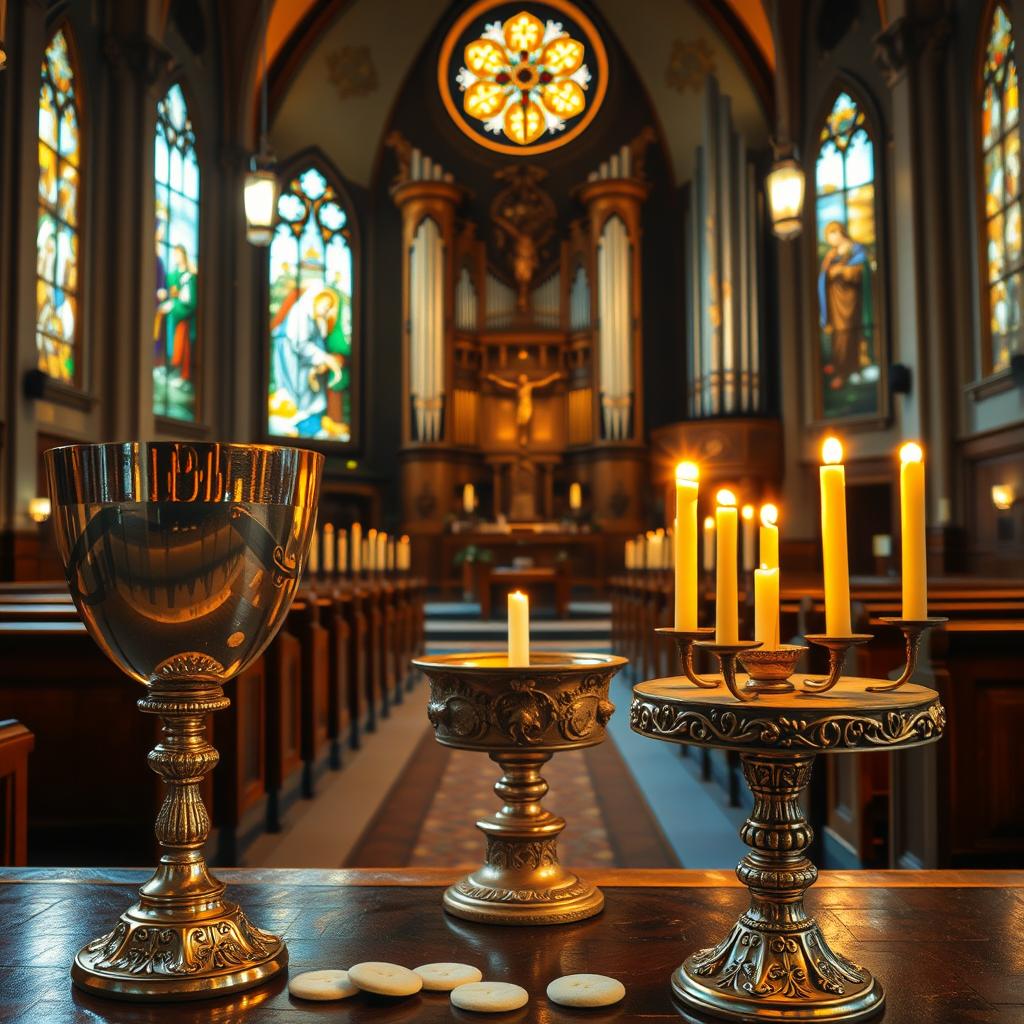
Baptism and Confirmation: Foundations of Faith
Baptism marks our start in the Christian community. It washes away original sin and makes us God’s children. Confirmation strengthens our faith, preparing us to share Christ’s message. Together, they set the stage for our spiritual growth.
Baptism gives us a new identity as God’s children. Confirmation empowers us to live this identity boldly. Both are vital for our spiritual journey, introducing us to grace and preparing us for challenges.
Eucharist: The Ultimate Spiritual Food
The Eucharist is the source and summit of our faith. It gives us Christ’s Body and Blood, nourishing our souls and uniting us with God and others. Regularly taking part in the Eucharist is essential for our spiritual health.
Communion reminds us of Christ’s sacrifice and strengthens us to follow His teachings. The Eucharist is a powerful source of spiritual nourishment, helping us face daily challenges and grow in holiness.
Reconciliation: Healing the Wounded Soul
Reconciliation, or Confession, offers forgiveness for our sins. It heals our relationship with God and the community. By confessing our sins, we acknowledge our weaknesses and receive God’s mercy.
Practical Ways to Prepare for the Sacraments
To get the most from the sacraments, preparation is crucial. Here are some steps:
- Regularly read Scripture to deepen your understanding of God’s love.
- Participate in catechesis or faith formation programs to learn more about the sacraments.
- Engage in prayer and reflection to prepare your heart for receiving the sacraments.
- Seek guidance from a spiritual director or a knowledgeable Catholic to help you navigate the sacraments.
By preparing our hearts and minds for the sacraments, we can fully experience their benefits and continue growing spiritually.
Prayer as a Shield: Catholic Prayer Traditions
Prayer is like a shield for our souls, as taught in Catholicism. Catholics use different prayer traditions to grow spiritually and keep their souls safe.
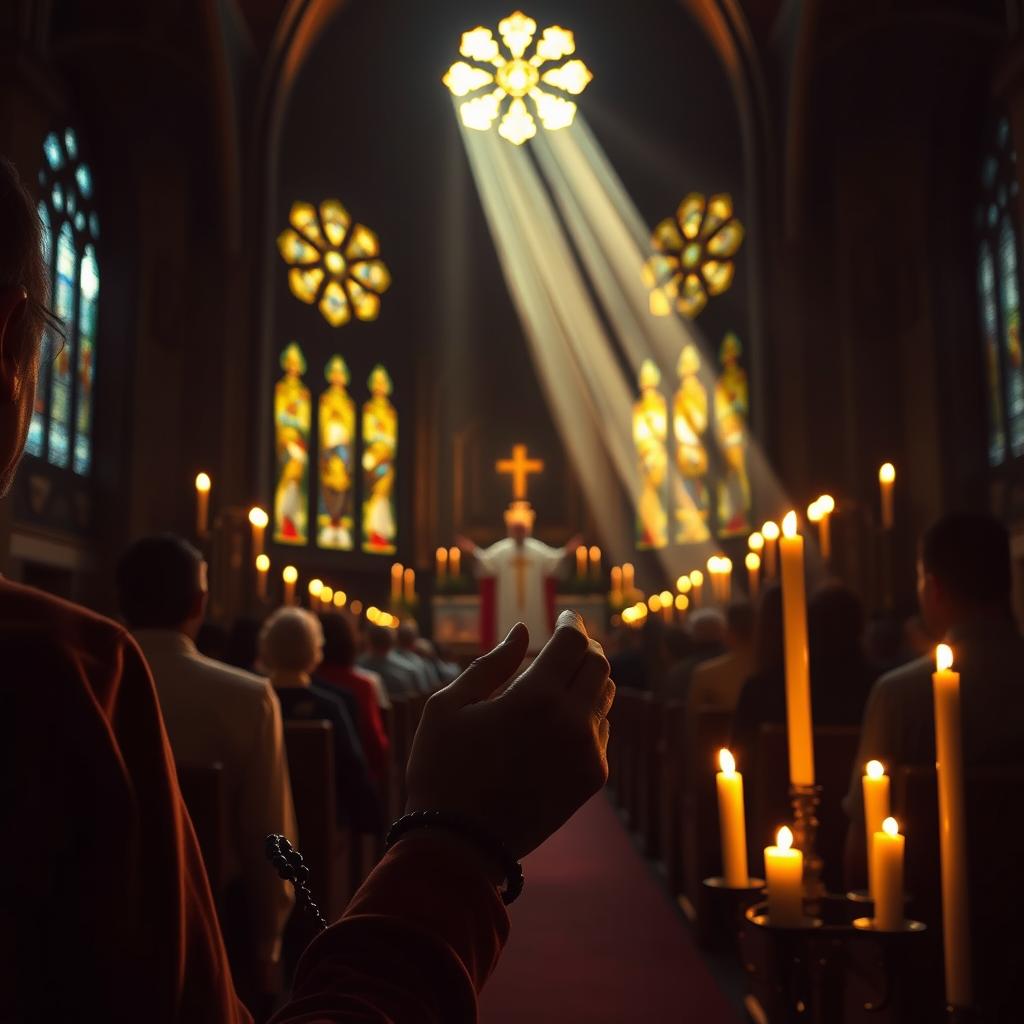
The Rosary: A Powerful Spiritual Weapon
The Rosary is a key prayer in Catholicism. It’s a powerful tool for thinking about Christ and Mary. Praying the Rosary helps deepen faith and seek Mary’s help when needed.
“The Rosary is a treasure trove of graces for those who pray it with devotion.” This quote shows how important the Rosary is in Catholic prayer. It’s a way to get spiritual blessings.
Liturgy of the Hours: Sanctifying Time
The Liturgy of the Hours, or Divine Office, is crucial in Catholicism. It’s about praying at different times to make our day holy. This keeps us connected to God all day.
Contemplative Prayer for Inner Peace
Contemplative prayer is about quiet reflection and listening to God. It helps find inner peace and grow closer to God. Through it, Catholics can grow spiritually.
Building a Consistent Prayer Routine
To benefit from these prayers, we need a regular prayer routine. Set a time each day for prayer. Use prayer books or apps. Find a quiet place for prayer. Regular prayer builds a strong spiritual life and protects our souls.
John Kubasak says in “Advancing in the Spiritual Life” that prayer is key for growth. By using Catholic prayers like the Rosary, Liturgy of the Hours, and contemplative prayer, we can grow closer to God.
How to Protect Your Soul Through Catholic Teachings
The Catholic faith offers many teachings and practices to protect our souls. These help us grow spiritually. By following these teachings, we can build a strong spiritual life ready for life’s challenges.
Daily Spiritual Practices for Soul Protection
Daily spiritual practices are key to protecting our souls and growing spiritually. Matthew Kelly said, “Our lives change when our habits change.” Some good practices include:
- Meditation and reflection on Scripture
- Prayer, especially the Rosary
- Going to daily Mass when you can
- Checking your conscience often
Adding these practices to our daily lives builds a strong spiritual foundation.
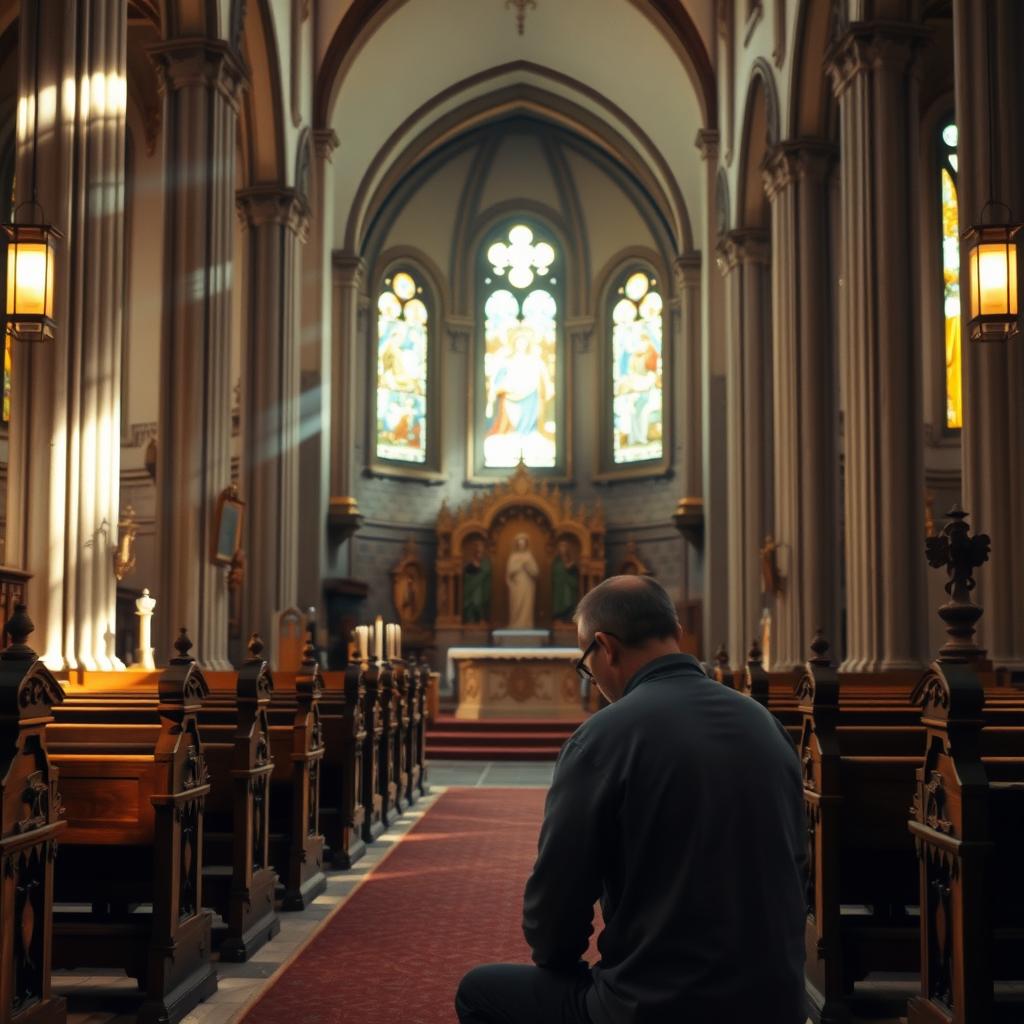
Creating a Personal Rule of Life
A personal Rule of Life is a plan for living out our faith. It combines prayer, work, and service, fitting our life and spiritual needs. A Rule of Life helps us:
“A Rule of Life is a pattern of behavior that helps us to be more faithful to God and to live more fully in love.” –
Recognizing and Responding to Spiritual Attacks
Spiritual attacks can take many forms, like temptation or doubt. Recognizing these attacks is crucial. Signs include:
- A feeling of spiritual dryness or detachment
- More temptation or struggle with sin
- Doubts about faith or calling
To fight these attacks, we can use prayer, sacraments, and seek guidance from spiritual directors or confessors.
By practicing daily, following a personal Rule of Life, and being alert to attacks, we protect our souls. We also deepen our bond with God through Catholic teachings.
The Role of Saints in Spiritual Guidance
The Catholic Church honors saints as examples of strong faith and devotion. These holy people lived lives full of commitment to their beliefs. By learning from them, Catholics can find guidance on their own spiritual paths.
Saints as Models of Spiritual Resilience
Saints have overcome many challenges, staying true to their faith. Their stories inspire Catholics facing their own struggles. For example, St. Teresa of Calcutta’s work with the poor shows how to live faith actively.
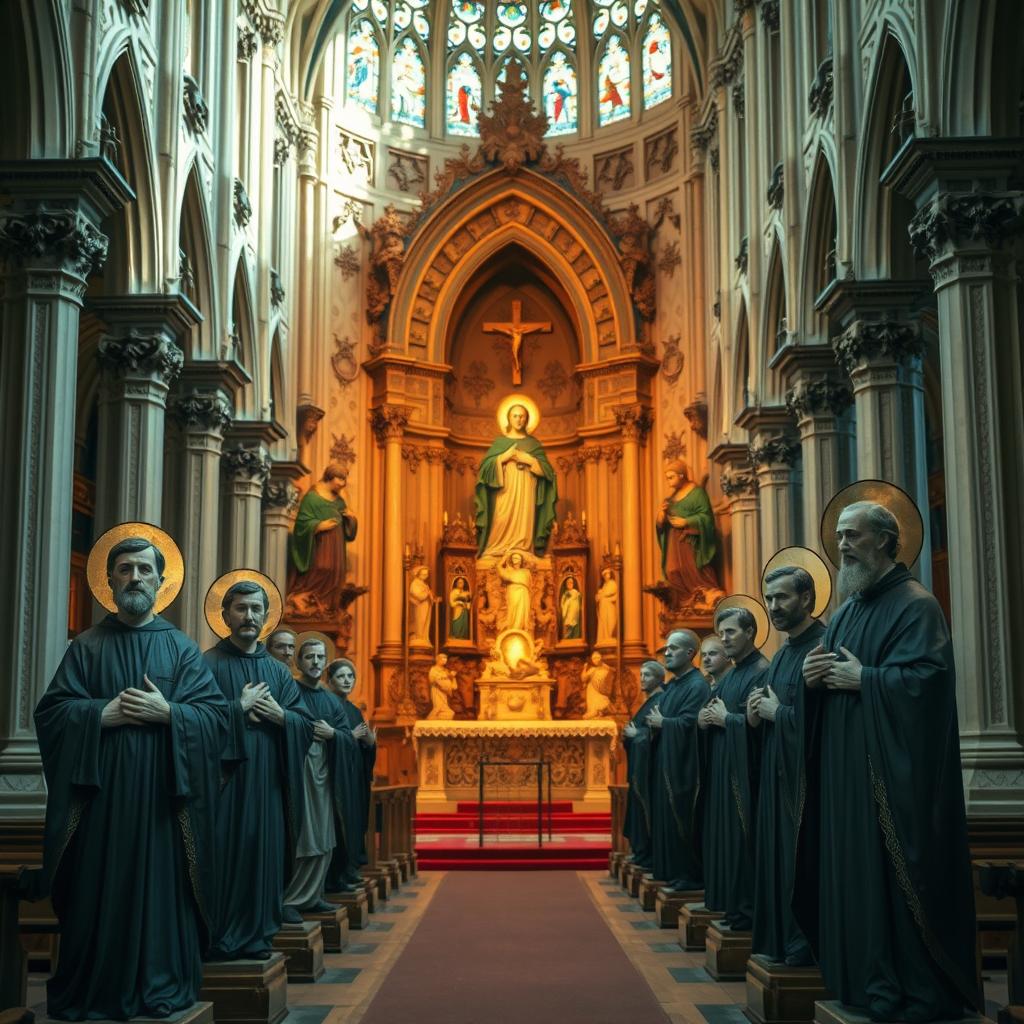
Patron Saints for Spiritual Protection
In Catholic tradition, patron saints offer spiritual protection and guidance. Many choose a patron saint to pray to for help and support. This connection can bring comfort and strength when needed.
Developing a Relationship with Your Patron Saint
To connect with your patron saint, learn about their life and teachings. Pray to them often, asking for their help and wisdom. Reflecting on their virtues can help you grow in faith and feel closer to them.
For instance, if St. Joseph is your patron, study his role as a protector and provider. Emulate his patience and compassion. This way, you can enrich your spiritual practice.
Catholic Virtues for Inner Strength
Catholic teachings highlight the importance of virtues in our spiritual journey. Virtues are habits that help us live morally and grow closer to God.
The Theological Virtues: Faith, Hope, and Charity
The theological virtues are given to us at Baptism. They are key for our spiritual growth. Faith lets us believe in God and accept His messages. Hope gives us confidence in God’s promises. Charity helps us love God and others deeply.
The Cardinal Virtues: Prudence, Justice, Fortitude, and Temperance
The cardinal virtues are human traits we can develop. They are vital for a virtuous life. Prudence guides us in making wise choices. Justice teaches us to treat others fairly. Fortitude gives us courage to stand up for what’s right. Temperance helps us control our desires and emotions.
Cultivating Virtues in Everyday Life
To grow virtues, we must practice them every day. Here are some ways to do so:
- Practice prudence by thinking carefully before acting.
- Cultivate charity by doing kind acts for others.
- Develop fortitude by standing up for your beliefs.
| Virtue | Description | Practical Application |
|---|---|---|
| Faith | Believing in God and His revelations | Attend Mass regularly and participate in Bible study |
| Hope | Trusting in God’s promises | Pray for perseverance and trust in God’s plan |
| Charity | Loving God and our neighbors | Engage in acts of kindness and volunteer work |

By embracing these virtues, we can strengthen our inner selves and deepen our relationship with God. As we strive to live virtuously, we become more like Christ, showing His love and compassion.
Spiritual Warfare in Catholic Tradition
Catholics are called to fight in spiritual warfare, a battle between good and evil. This fight is key to growing spiritually, as taught in Catholic teachings.
Understanding Temptation and Sin
Spiritual warfare means fighting against temptation and sin. Catholic teachings say temptation isn’t bad by itself. But, it can lead to sin if not fought against. The Catechism of the Catholic Church says we must be careful, quoting the Lord’s Prayer: “Lead us not into temptation” (CCC 2847).
Resisting temptation needs a strong faith and practicing virtues. Virtues like prudence, justice, fortitude, and temperance help us face spiritual battles.
Catholic Prayers for Spiritual Protection
Catholic prayers are vital in spiritual warfare, offering protection and strength. The Rosary is especially powerful, asking for Mary’s help.
Prayers for Spiritual Protection
| Prayer | Purpose |
|---|---|
| Rosary | Invokes Mary’s intercession for protection |
| St. Michael Prayer | Seeks protection against Satan and evil spirits |
| Divine Mercy Chaplet | Prays for mercy and protection |
The Role of Angels in Soul Protection
In Catholic tradition, angels protect souls. Guardian angels watch over us, guiding and shielding us from harm.
Practical Steps During Spiritual Battles
When facing spiritual battles, Catholics can take steps to seek divine help. These include:
- Practicing prayer and sacramental life
- Seeking guidance from spiritual directors
- Cultivating virtues and good habits

By understanding spiritual warfare and taking these steps, Catholics can face their spiritual journey with confidence. They trust in divine guidance.
Catholic Devotions for Spiritual Growth
In my faith journey, I’ve found that Catholic devotions are key for spiritual growth. These practices offer comfort, guidance, and strength to many worldwide.
Catholic devotions are rich and varied. They help deepen faith and connect with God. They allow us to show love and seek saints’ help.
Sacred Heart Devotion
The Sacred Heart Devotion shows love for Jesus Christ. It sees His heart as a symbol of divine love. This devotion helps grow a deeper love for Christ and trust in His mercy.
By honoring the Sacred Heart, we learn more about God’s love and mercy. This leads to spiritual growth and a stronger faith.
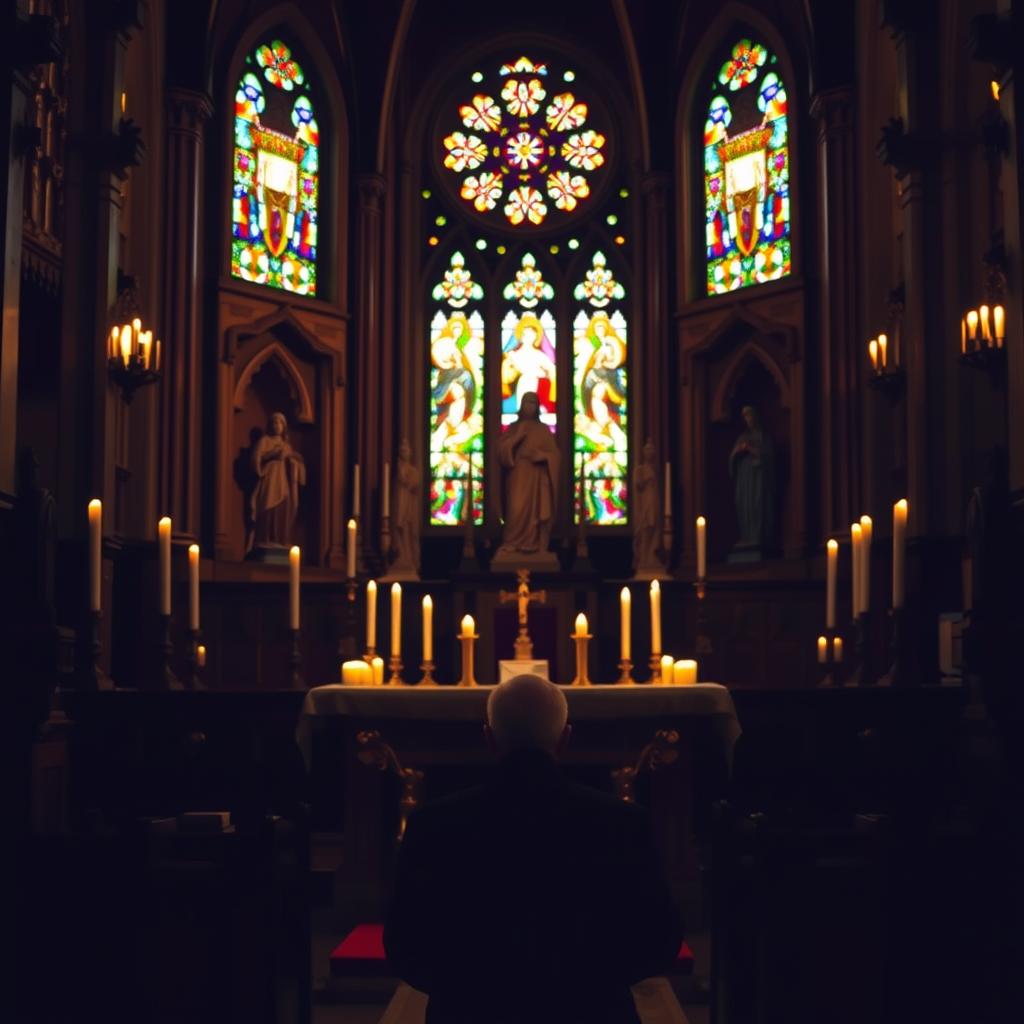
Divine Mercy Devotion
The Divine Mercy Devotion, made famous by Saint Faustina Kowalska, focuses on God’s mercy and love. It teaches us to trust in God’s mercy and seek forgiveness through sacraments.
This devotion is especially meaningful during Easter, especially on Divine Mercy Sunday, the first Sunday after Easter.
Marian Devotions
Marian devotions are a big part of Catholic tradition. They honor the Blessed Virgin Mary and seek her help. These devotions include praying the Rosary, celebrating Mary’s feast days, and venerating her under different titles.
Incorporating Devotions into Family Life
Adding Catholic devotions to family life is a beautiful way to grow spiritually together. Families can pray the Rosary, celebrate feast days, or take a moment each day to pray together.
This helps families build a strong faith foundation. It also supports each other on their spiritual paths.
Through these devotions, Catholics can feel closer to God and the saints. This leads to significant spiritual growth and a stronger faith.
The Transformative Power of Catholic Scripture Study
Catholic scripture study is a journey that enlightens and transforms. It deepens faith and understanding of God’s word. As I explore Catholic teachings, I see scripture study as a key to growth.
Lectio Divina: Praying with Scripture
Lectio Divina, or “divine reading,” is a traditional Catholic method. It involves four steps: reading, meditation, prayer, and contemplation. This practice helps me connect deeply with scripture.
For example, when reading the Gospels, I reflect on Jesus’ words. This reflection allows the message to resonate within me. Meditation and prayer lead to moments of peace and understanding.
Bible Study Resources
There are many Bible study resources for Catholics. These include study Bibles, commentaries, and online tools. They offer historical context, theological insights, and practical applications.
| Resource Type | Description | Benefit |
|---|---|---|
| Study Bibles | Include notes and commentary to enhance understanding | Provides context and insights into scripture |
| Commentaries | Detailed explanations of biblical texts | Helps to clarify complex passages |
| Online Resources | Access to a wealth of information on scripture and Catholic teachings | Convenient and accessible |
Applying Scripture to Daily Challenges
Scripture study guides daily life. Reflecting on scripture helps me find guidance and strength. It informs my decisions and offers comfort.
For instance, facing a tough decision, I turn to scripture for wisdom. Praying with the text and seeking guidance from Catholic teachings helps me understand how to proceed.
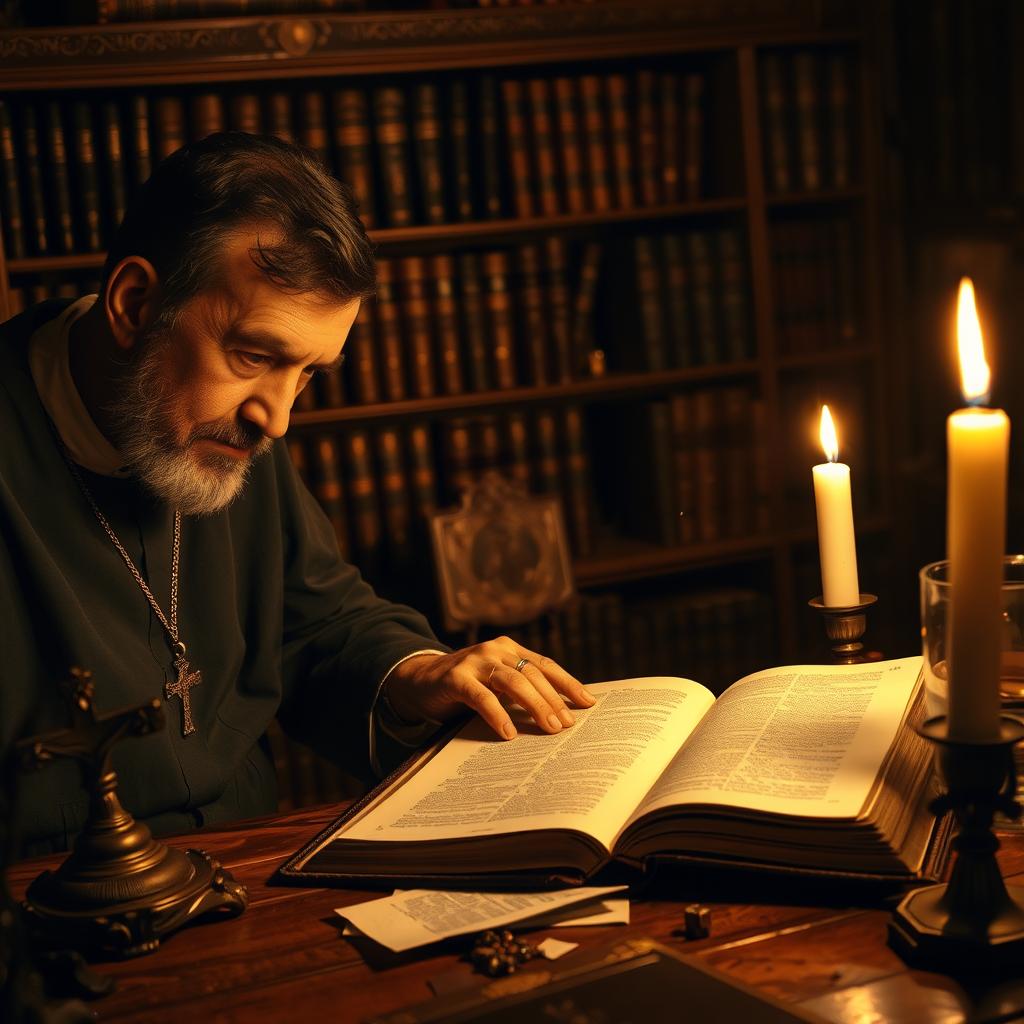
Through scripture study, I’ve seen the transformative power of God’s word. Engaging with scripture through Lectio Divina and using study resources deepens my faith. It helps me apply its teachings to my daily life.
Catholic Spiritual Direction and Accompaniment
Catholic spiritual direction helps people explore their faith and grow spiritually. It involves guidance from a spiritual director. This director helps individuals discern God’s will and deepen their relationship with Him.
Finding the right spiritual director is key. A spiritual director is trained to provide spiritual guidance and support. They help individuals navigate their spiritual journeys, offering insights and advice based on Catholic teachings.
Finding a Spiritual Director
To find a spiritual director, start by asking your local church or Catholic community. Many dioceses offer spiritual direction services or lists of approved directors. It’s important to find someone who understands your spiritual needs and aligns with Catholic teachings.
The Spiritual Exercises of St. Ignatius
The Spiritual Exercises of St. Ignatius are a core part of Catholic spiritual direction. These exercises include prayers, meditations, and contemplative practices. They help individuals deepen their faith and discern God’s will. The exercises are usually done over 30 days and are a powerful tool for spiritual growth.
What to Expect in Spiritual Direction
In spiritual direction, you’ll have open and honest discussions about your spiritual journey. Your spiritual director will listen, offer guidance, and help you reflect on your faith. The goal is to deepen your understanding of God’s presence in your life and grow spiritually.
Some key aspects of spiritual direction include:
- Regular meetings with your spiritual director
- Reflection on your spiritual experiences and challenges
- Guidance on prayer and meditation practices
- Support in discerning God’s will for your life
Engaging in Catholic spiritual direction can lead to significant spiritual growth and a deeper faith connection. As Charisse Tierney discusses in her article “Five Ways to Grow in Holiness During Lent,” spiritual direction is a valuable resource for deepening your spiritual life.

Catholic Retreats and Spiritual Renewal
The Catholic tradition of retreats is a powerful way to reflect and grow spiritually. Retreats give us a chance to step away from daily life’s distractions. They help us focus on our spiritual journey.

Types of Catholic Retreats
Catholic retreats vary to meet different needs and preferences. Some focus on specific themes or spiritual practices. Others build community or encourage personal reflection.
- Directed Retreats: These offer one-on-one guidance from a spiritual director. They help participants find their spiritual path.
- Preached Retreats: These feature talks or homilies by a retreat leader. They often explore specific spiritual themes.
- Silent Retreats: These emphasize silence and contemplation. They provide a space for quiet reflection and prayer.
Creating Mini-Retreats in Daily Life
Not everyone can go to a formal retreat. But, we can bring retreat principles into our daily lives. Creating mini-retreats means setting time for prayer, reflection, and spiritual practices.
- Find a quiet space for prayer and reflection.
- Use guided meditations or spiritual readings to focus your time.
- Practice mindfulness and presence in your daily activities.
Post-Retreat Integration Practices
After a retreat, it’s key to integrate the insights and graces into daily life. This can mean setting new spiritual goals, adopting practices, or staying aware of your spiritual journey.
- Journaling: Writing down insights and reflections from the retreat can help solidify the experience.
- Spiritual Direction: Continuing with spiritual direction can provide ongoing support and guidance.
- Community Engagement: Sharing the retreat experience with others can foster a sense of community and accountability.
By embracing the tradition of Catholic retreats, we can experience deep spiritual renewal and growth. This deepens our relationship with God and enriches our spiritual lives.
Conclusion: Embracing the Journey of Soul Protection
Protecting our soul is key in today’s world, especially with Catholic teachings. This journey helps us grow spiritually and connect more with God.
Growing spiritually takes effort, as Charisse Tierney’s article “Five Ways to Grow in Holiness During Lent” shows. By adding daily spiritual practices and Catholic devotions, we can keep our souls strong. This shields us from the digital world’s challenges.
The sacraments, prayer, and Catholic saints help us feed our souls. They protect us from spiritual harm. By staying true to our faith, we start a journey of growth. This journey helps us understand God’s love better.
Thinking about soul protection reminds me it’s a journey we can take together. Following Catholic teachings and being part of a community helps us grow spiritually. It deepens our bond with God and brings us peace.





